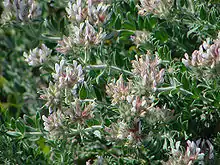Lotus hirsutus
Lotus hirsutus, also known by the synonym Dorycnium hirsutum,[1] common name: canary clover[2] or hairy canary-clover,[3] is a species of flowering plant in the legume family Fabaceae.[1]
| Lotus hirsutus | |
|---|---|
 | |
| Scientific classification | |
| Kingdom: | Plantae |
| Clade: | Tracheophytes |
| Clade: | Angiosperms |
| Clade: | Eudicots |
| Clade: | Rosids |
| Order: | Fabales |
| Family: | Fabaceae |
| Genus: | Lotus |
| Species: | L. hirsutus |
| Binomial name | |
| Lotus hirsutus | |
| Synonyms[1] | |
| |
Description
It is a low-growing, domed semi-evergreen subshrub, reaching on average 20–50 centimetres (7.9–19.7 in) in height. Its habit is erect, green, hairy and branched. The silver leaves are sessile, alternate and quite fuzzy. The flowers are white veined pinkish-red, in terminal umbels composed of four to ten flowers. The flowering period extends from May through July. The fruits are cylindrical reddish brown seed pods.[4]
Distribution
This plant is native to the Mediterranean Basin, from Portugal to Turkey and south to northern Africa.[1]
Habitat
The typical habitat of this sub-shrub is grassland, in well-drained soil. Plants can be found at an altitude of 0–1,500 metres (0–4,921 ft).
Cultivation
This plant is found in cultivation. Though hardy down to −10 °C (14 °F), it requires a sheltered spot in full sun. In the United Kingdom it has won the Royal Horticultural Society's Award of Garden Merit.[4][5]
Gallery
 Flowers
Flowers Flowers
Flowers Flower
Flower Leaves
Leaves
References
- "Lotus hirsutus L.", Plants of the World Online, Royal Botanic Gardens, Kew, retrieved 2018-10-04
- "BSBI List 2007". Botanical Society of Britain and Ireland. Archived from the original (xls) on 2015-01-25. Retrieved 2014-10-17.
- "Dorycnium hirsutum". Natural Resources Conservation Service PLANTS Database. USDA. Retrieved 18 January 2016.
- "RHS Plantfinder - Lotus hirsutus". Retrieved 29 March 2018.
- "AGM Plants - Ornamental" (PDF). Royal Horticultural Society. July 2017. p. 62. Retrieved 25 March 2018.
- Pignatti S. - Flora d'Italia - Edagricole – 1982. vol. III
- Tutin, T. G., eds. 1964 -1980 - Flora europaea